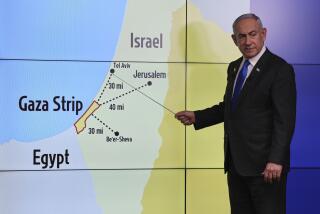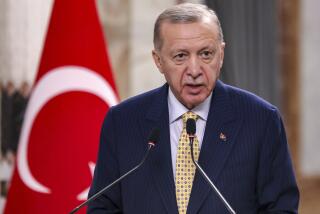Turkey’s prime minister to meet with Egypt’s leaders
Turkish Prime Minister Recep Tayyip Erdogan is expected to meet with Egyptian leaders Tuesday to strengthen strategic ties at a time both nations are experiencing deepening rifts with Israel over military actions and the fate of the Palestinians.
Relations between Turkey and Egypt have been cool for years. But since the fall of Egyptian President Hosni Mubarak, Cairo has embarked on a foreign policy more tuned to regional public sentiment and less beholden to Israel and the United States.
Turkey and Egypt have been Israel’s closest Muslim allies, but recent tensions are altering those dynamics just as the Arab world is in the throes of revolution and political change. Animosities have been further heightened by the Palestinians’ plans to call on the United Nations this month to recognize Palestinian statehood.
Erdogan’s visit comes as Turkey is moving “to convert Egypt’s popular anger with Israel to favor Turkish regional interests,” said Nabil Abdel Fattah, an analyst with Al Ahram Center for Political and Strategic Studies in Cairo. “It’s a Turkish attempt build an isolating barrier to Israel’s arrogant policies in the Middle East.”
The Turkish leader, who supports swift recognition of Palestinian independence, was scheduled to meet Palestinian Authority President Mahmoud Abbas on Monday night in Cairo. On Tuesday, Erdogan is expected to hold talks with Field Marshal Mohamed Hussein Tantawi, the head of Egypt’s ruling military council, before traveling to Libya and Tunisia.
Turkey is not an Arab country and, after centuries of rule by Ottoman Turks, many here have historical misgivings about its new prominence. But Erdogan is hoping to tap into the spirit of the so-called Arab Spring, perhaps the region’s most transformative moment since the doomed pan-Arabism of the 1960s, to expand Turkey’s reach.
Turkey recently cut trade with Israel and expelled its ambassador after Israel refused to apologize for last year’s commando raid that killed nine Turks on an aid ship sailing in international waters toward the Gaza Strip. Erdogan has said that in the future Turkey would send naval ships to protect Gaza-bound humanitarian flotillas in the Mediterranean Sea.
Egypt did get an Israeli apology last month for the accidental shooting of five of its soldiers by Israeli forces along the two countries’ border. But outrage in Egypt led to last week’s storming of the Israeli Embassy in Cairo by protesters.
Egypt under Mubarak was suspicious of Turkey’s rising economic and diplomatic prowess, fearing that Erdogan was attempting to upstage Cairo’s traditional leadership role on Palestinian and other matters. Erdogan, unlike the aging and frail Mubarak, was dynamic and outspoken; his criticism of Israel made him a hero for Muslims across the region.
Erdogan’s visit has also raised the stakes for Tantawi and Egypt’s military-backed interim government. Activists blame Egypt’s leaders for human rights abuses and not moving quickly enough toward reform. The nation appears stalled and dismayed, and when measured against Erdogan’s flinty populism, the generals seem a throwback to the old regime. Hundreds of Egyptians, including Muslim Brotherhood members, greeted Erdogan at the Cairo airport Monday night, waving banners and cheering.
Some Egyptian politicians have often suggested that Egypt’s new democracy — if it ever comes — could resemble Turkey’s mix of democracy and Islam. Both countries have historically strong militaries. Erdogan has gradually clipped his army’s influence on the government, but, so far, Egypt’s generals show no inclination to have their power weakened under a new constitution.
“Turkey is working to attract Egypt’s political elite, hoping they will reproduce Turkey’s political model,” said Ammar Ali Hassan, an analyst for the Middle East Center for Political and Regional Studies. “That’s why Turkey is leaning east after years of focusing [on Europe] and the West.”
Erdogan’s anti-Israeli rhetoric could rile passions in Egypt just as Cairo and Jerusalem are attempting to mend relations after the embassy attack. Israeli Prime Minister Benjamin Netanyahu moved swiftly to limit the diplomatic damage and Egypt’s generals, stung by international criticism, want to show they are committed to the landmark 1979 peace treaty between Egypt and Israel.
“The Turkish position vis-a-vis Israel is very popular with Egyptians,” Abdel-Alim Mohamed, an analyst specializing in Israel, told the independent Al Masry al Youm. “It conveys a dignified stance that resonates with and inspires segments of the Egyptian population.”
That anti-Israel mood could become more pronounced if the Muslim Brotherhood and other Islamist parties do well in Egypt’s parliamentary elections in November. Such a tilt could further isolate Israel as the region’s two largest and most prominent Muslim nations grow less influenced by the U.S. and Europe.
Turkish Foreign Minister Ahmet Davutoglu said over the weekend that Israel was “out of touch with the region and unable to perceive the changes taking place, which makes it impossible for the country to have healthy relations with its neighbors.”
Egypt’s military-backed government, said Fattah, faces balancing “Egypt’s previous commitments and ties with Israel … with the popular demands of changing the country’s foreign and regional policies after the revolution.”
Amro Hassan of The Times’ Cairo bureau contributed to this report.
More to Read
Sign up for Essential California
The most important California stories and recommendations in your inbox every morning.
You may occasionally receive promotional content from the Los Angeles Times.











